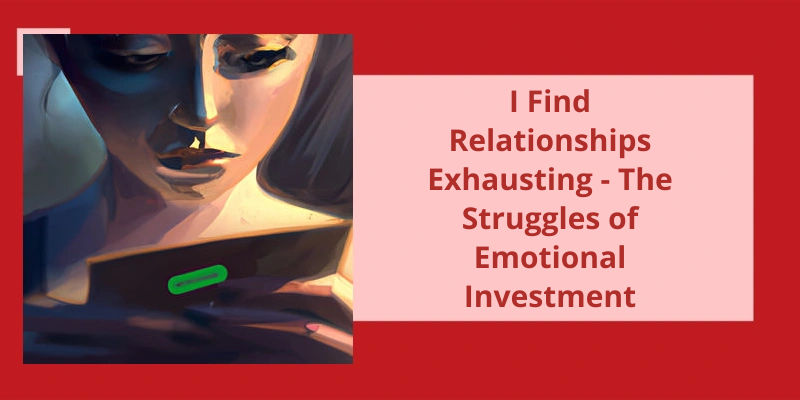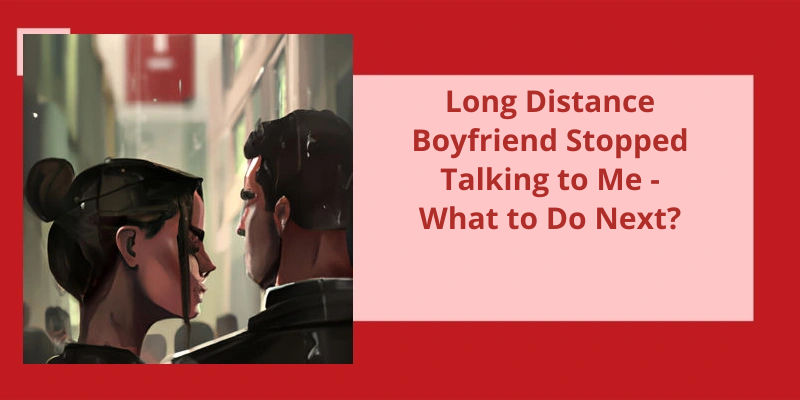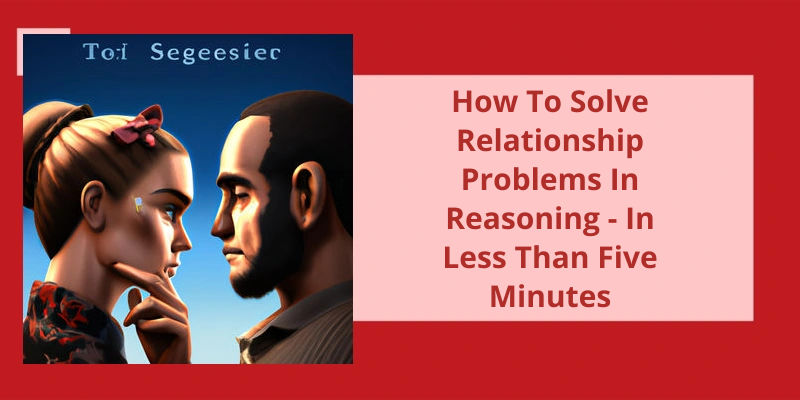Navigating the complex waters of romantic relationships can be a challenging feat for many individuals. Whether it’s due to past experiences or simply being overwhelmed by the demands of intimacy, some people may find themselves feeling exhausted at the prospect of being in a relationship. There are many factors that can contribute to this feeling, including anxiety, stress, and depression. Unfortunately, for those who’re already grappling with these issues, a romantic relationship can exacerbate these feelings even more. That’s why it’s critical to seek out professional help if you feel as though your relationship is having a detrimental impact on your mental health. Licensed mental health professionals and relationship counselors like Cherlyn Chong can be invaluable resources in helping you navigate the complexities of your romantic life while prioritizing your emotional well-being. Whether you’re questioning the health of your current relationship or need guidance in building healthy relationship habits, seeking professional support can help you find the peace and clarity you deserve.
How Do You Fix Relationship Fatigue?
Relationships are important, and over time they can develop fatigue. This fatigue can result from a variety of factors, such as stress, daily routines, and the simple monotony of life. It’s important to recognize and address this fatigue before it spirals out of control.
To combat relationship fatigue, it’s important to carve out alone time. Sometimes, lifes hectic pace can make it feel like theres no time to breathe, let alone relax with a significant other. One way to avoid this feeling is by scheduling alone time. This time doesn’t necessarily have to involve anything extravagant or costly; it can just be time to unwind, relax, or engage in a hobby.
Another way to combat relationship fatigue is to make time to connect. We can get so caught up in our routines that we forget to connect with our partners. Schedule a weekly check-in or date night, where you can catch up and reconnect.
It’s also important to make room for bad moods. We all have bad days, and it can be difficult to connect with our partners when were feeling down. Instead of dismissing negative emotions or bottling them up, give them space to be expressed. This can help create a realistic and understanding relationship dynamic.
Communication is key, so it’s important to clarify expectations and set boundaries. Without clear expectations, misunderstandings and resentment can fester. Set boundaries around your and your partners needs and communication styles so that you can work together effectively.
Finally, do novel things and watch more comedies. In addition, laughing and enjoying each others company can help offset any negativity or stress that may be present in a relationship. Comedy can also help to lighten the mood and bring a sense of levity to your interactions.
By carving out alone time, making room for bad moods, clarifying expectations and setting boundaries, and trying novel things, you can revive your relationship and strengthen your bond. Taking small steps like these can go a long way in the quest to overcome relationship fatigue.
Addressing Underlying Issues or Conflicts That May Be Contributing to Relationship Fatigue
When a couple is struggling with relationship fatigue, it may be helpful to address any underlying issues or conflicts that are contributing to the problem. This can involve having open and honest communication, identifying patterns of behavior that are causing discomfort or tension, and working together to find solutions that can improve the relationship. By addressing these issues, couples can create a healthier and more fulfilling dynamic that can help them to feel more connected and satisfied with each other.
It’s natural to experience ups and downs in any relationship, but persistent feelings of exhaustion and frustration shouldn’t be ignored. Instead, understanding the root causes of why relationships can make you feel drained can help you take steps to address these issues and create a more fulfilling partnership.
Why Do Relationships Make Me Feel Drained?
But when your needs are consistently not being met, it can lead to feelings of exhaustion and dissatisfaction.
Additionally, relationships often require a lot of emotional labor. This includes things like communicating effectively, compromising, and being vulnerable with your partner. When you invest a lot of time and energy into a relationship, it’s understandable that you might feel drained if those efforts arent being reciprocated.
It’s also possible that you might be prioritizing your relationship at the expense of other important areas of your life. For example, if youre neglecting your own self-care, hobbies, or friendships in order to focus on your partner, it can lead to burnout and feeling drained. It’s important to maintain a balance between your relationship and your individual needs and interests.
Another factor that can contribute to feeling drained in relationships is if you’re constantly trying to fix or save your partner. It’s important to remember that you can’t change someone else or force them to change. If you feel like youre constantly trying to fix problems in your relationship or trying to change your partner, it can be exhausting and ultimately fruitless.
Finally, it’s possible that you might simply need some time and space to recharge. Relationships require a lot of emotional energy, and it’s okay to take a step back and prioritize your own well-being. Taking time for self-care, pursuing your own interests, and spending time with friends and family can help you feel more energized and fulfilled.
If youre struggling with this, it might be helpful to talk to a trusted friend, therapist, or relationship coach to help you identify the root causes and find strategies for feeling more fulfilled in your relationships.
How to Differentiate Between Temporary Relationship Fatigue and Chronic Relationship Exhaustion
- Temporary relationship fatigue:
- Feelings of being disconnected from your partner are mild and short-lived
- You still have positive feelings towards your partner and the relationship as a whole
- You’re willing to put in effort to work through the issues
- You’re able to identify the underlying causes of the fatigue and address them
- The fatigue is related to a specific event or circumstance (e.g. job stress, family conflict)
- Chronic relationship exhaustion:
- Feelings of disconnection from your partner are persistent and severe
- You’ve negative feelings towards your partner and the relationship as a whole
- You’re no longer willing to put in effort to work through the issues
- You’re unable to identify the underlying causes of the exhaustion
- The exhaustion isn’t related to a specific event or circumstance, but is a general feeling of dissatisfaction with the relationship
Source: Why does being in a relationship (in general) feel draining …
When it comes to relationships, burnout can happen to anyone. There are various factors that can lead to relationship exhaustion, and it’s important to know the signs so that you can take action and prevent further damage. From disengagement to frequent fighting and a lack of interest in sex, there are many different indicators of burnout in a relationship. Let’s take a closer look at some of the most common signs so that you can recognize them if they arise.
What Are the Signs of Relationship Exhaustion?
Relationship exhaustion is a common and natural phenomenon that occurs when couples have been together for an extended period of time. Some people may experience emotional fatigue, while others may feel physically exhausted. However, there are several warning signs that indicate a relationship may be heading towards burnout.
This can manifest in several ways, including a lack of interest in talking about your day, feeling bored in each others company, or feeling disconnected emotionally. You may also find that you don’t enjoy spending time with your partner as much as you used to.
Another sign of burnout in a relationship is frequent fighting. While it’s normal for couples to argue from time to time, frequent arguments can be a sign that there are deeper issues at play. If you find that you and your partner are arguing more than usual, it may be time to take a step back and reassess the health of your relationship.
A lack of interest in having sex with your partner is another sign of burnout. This is particularly true if sex was once an important part of your relationship but has since become less important. If you find that you don’t feel attracted to your partner anymore or that youre not interested in being intimate, it may be time to take a break and reevaluate your relationship.
Feeling more negative or cynical about your partner is another warning sign that your relationship may be heading towards burnout. If you find that youre constantly criticizing your partner or that youre more likely to see the negative aspects of your relationship than the positive, it may be time to take a step back and work on developing a more positive outlook.
Dreading spending time with your partner is another sign that your relationship may be in trouble. If you find that youd rather spend time alone than with your partner or that youre always looking for excuses to avoid spending time with them, it may be time to reassess your relationship.
Finally, if your relationship creates more stress than support, it may be time to take a break. While all relationships have their ups and downs, if you find that your relationship is causing more stress than happiness or support, it may be time to reevaluate your priorities and your needs. Remember, a healthy relationship should make you feel happy, safe, and fulfilled.
Tips for Preventing Relationship Exhaustion
Preventing relationship exhaustion involves taking intentional breaks, setting boundaries, prioritizing self-care, practicing effective communication, and being mindful of the balance between giving and receiving in the relationship. Additionally, it’s important to address any underlying issues or patterns that may be contributing to relationship exhaustion.
As much as we crave to find love and experience all the exhilarating sensations that come with it, the journey towards it can be more draining than we realize. The emotional rollercoaster of dating can often take a toll on a person, leading to what’s commonly known as ‘romance fatigue.’ This phenomenon is characterized by a state of emotional exhaustion and burnout experienced by individuals in their pursuit of romance. Let’s delve deeper into what causes romance fatigue and how to combat it.
What Is Romance Fatigue?
In simpler terms, it’s the feeling of becoming jaded and cynical towards the concept of romance. This can be caused by a variety of factors, such as a series of failed relationships or unsuccessful dating endeavors. The constant cycle of meeting new people, going on dates, and feeling disappointed can leave one feeling drained and disheartened.
Romance fatigue can also come from the pressure placed on individuals to constantly be in search of a romantic partner. Whether it’s from societal expectations or personal desires, the emphasis on finding the one can be overwhelming. This pressure causes many people to engage in a never-ending cycle of pursuing romantic interests, even if they aren’t fully invested or interested.
While these platforms can offer a convenient way to meet potential partners, the constant swiping and scrolling can be tiresome. It can also create a culture of disposability where people are seen as replaceable commodities rather than individuals with unique personalities and characteristics.
In addition, the modern dating scene can be quite complicated with many unspoken rules and expectations. From ghosting to breadcrumbing, there are numerous behaviors that can leave one feeling confused and disenchanted. This can lead to people losing trust in the process and feeling hesitant to engage in romantic relationships altogether.
It can be discouraging to constantly put oneself out there only to experience rejection or disappointment. However, it’s important to remember that finding love isn’t the only path to happiness and fulfillment in life. By focusing on personal growth and building fulfilling relationships in other areas of life, it’s possible to overcome romance fatigue and find joy in other aspects of life.
Signs and Symptoms of Romance Fatigue to Look Out For
Romance fatigue is a feeling of emotional exhaustion and disinterest in romantic relationships. Some signs and symptoms of romance fatigue include feeling bored or apathetic towards dating, avoiding physical contact, lack of interest in engaging in romantic conversations, and feeling emotionally detached from potential partners. It’s important to be aware of these symptoms and take necessary steps to address them in order to maintain a healthy relationship with oneself and others.
Navigating the modern dating scene isn’t always easy, and it’s common to experience feelings of weariness from time to time. If you’re finding yourself experiencing dating fatigue, there are ways to deal with it and regain a positive outlook on the process. By being mindful of your assumptions, setting boundaries, identifying energy-zapping factors, meditating on your reasons for dating, and not taking rejection too personally, you can improve your overall experience and approach dating with a fresh perspective.
How Do You Deal With Dating Fatigue?
Dating fatigue can be an overwhelming and frustrating experience for anyone who’s trying to find their significant other. It isn’t uncommon to feel drained and exhausted after a long period of constantly swiping left or right on dating apps, going on numerous dates, and constantly putting yourself out there.
It’s easy to fall into the trap of self-doubt and negative self-talk, but it’s important to challenge those thoughts and analyze them carefully. By focusing on the present and reminding yourself that everyone experiences setbacks and uncertainty, you can begin to shift your mindset and reduce your anxiety.
In addition, setting boundaries is another vital component when dealing with dating fatigue. It’s important to recognize the causes of your exhaustion and to set clear limits on what you can handle. Taking breaks from the dating scene, limiting the time spent scrolling through dating apps, and being honest with yourself and others about what you want can all be helpful in protecting your emotional well-being.
Identifying whats zapping your energy is another significant step in combating dating fatigue. Whether it be constantly going on dates with incompatible people or over-analyzing every text message you receive, it’s critical to recognize what’s causing your fatigue and address it head-on. By doing so, you can establish more efficient dating strategies that work for you and conserve your energy for the more promising opportunities.
Taking time to meditate and reflect on your “why?” can also be an effective way to reduce dating fatigue. Understanding your genuine reasons for dating can help you maintain a grounded desire and focus on the end goal. Whether it’s to find a life partner or to learn more about yourself, having a clear sense of purpose can be motivating and empowering.
Lastly, try not to take rejection too personally. It’s important to remember that not every date will turn out the way you want it to, but that doesn’t mean you should lose hope or give up altogether. By understanding that rejection is a natural part of the dating process, you can eliminate unnecessary stress and gain the resilience to keep going.
How to Recognize Red Flags and Avoid Dating Burnout
- Feeling mentally or emotionally exhausted after dating
- Feeling constantly anxious or frustrated about the dating process
- Ignoring important red flags or warning signs in a potential partner
- Feeling like you’re settling for someone who isn’t right for you
- Feeling like you’re always compromising or sacrificing your own needs and wants
- Feeling like you’re constantly questioning your own judgment or intuition when it comes to dating
- Feeling like you’re wasting your time or energy on people who don’t value you or your time
- Experiencing a lack of trust or faith in the dating process and in yourself
- Losing interest in dating altogether or feeling like it’s become a chore or burden
Conclusion
In conclusion, relationships can be rewarding, but they can also be exhausting and draining, especially if they’re impacting our mental health negatively. It’s important to recognize the signs of anxiety, fatigue, or depression in ourselves when we're around our partners and to take action by seeking professional support. Whether it’s through counseling or therapy, seeking the help of a licensed mental health professional can give us the tools and strategies we need to address our mental health and strengthen our relationships. Cherlyn Chong is a breakup specialist who provides a valuable service in helping her clients reevaluate their relationships and prioritize their mental health. Ultimately, putting our mental health first is essential to creating a happy and fulfilling life, both within and outside of our romantic relationships.






